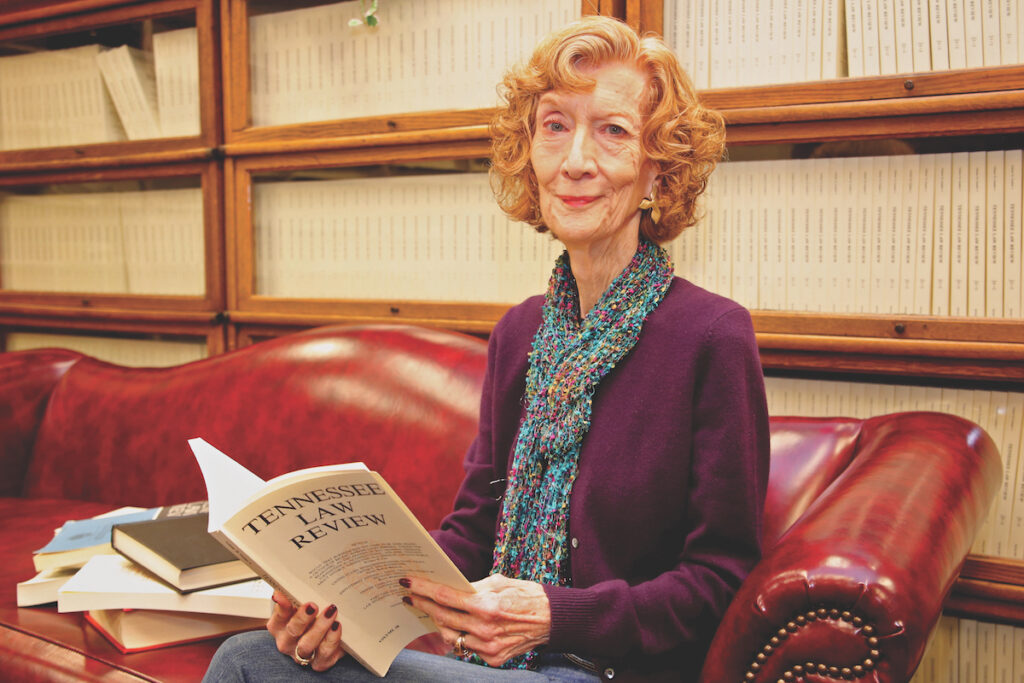By Luis Ruuska
The first part of this two-part interview with UT Law staff member, Micki Fox, originally appeared in the spring 2015 issue of Tennessee Law. Read it here.
Micki Fox, business manager of the Tennessee Law Review and continuing legal education (CLE) coordinator, has been with UT Law for forty-four years and has seen generations of students, faculty, and staff come and go throughout her tenure.
Affectionately known as the “mother of the Law Review,” Fox began working with the publication in 1971 as a manuscript typist. Within the decade, she was promoted to senior bookkeeper and eventually business manager. A little over a decade ago, Fox took on an additional role at the college, becoming the CLE coordinator.
Q: What is an interesting piece of history that goes along with the Tennessee Law Review?
FOX: Howard Baker, Sr. was on our editorial board for our first edition of the Law Review in 1922. His son, Howard Baker, Jr., spoke at UT Law a few years ago and called me and said, “My dad was on the Law Review and I think he wrote something. Is there any way you could get me a copy?” So I worked on collecting materials between the time he asked me and the time of the banquet where he was speaking and I found that his father had written about five things. I printed them out and took them to Senator Baker that night at the banquet and it gave me so much pleasure to see the look on his face; you would have thought I had given him pure gold! He wrote me the nicest thank you letter that I’ve kept in my scrapbook since then.
What have been some of your favorite memories throughout your career here at UT Law?
Can I tell you one thing that I did here that I really love?
We had a wonderful dean and his name was Tom Galligan. One time he stopped me in the hall and asked me what I had done over Christmas and I said, “Well, it was my son’s 40th birthday and he wanted to do something he had never done before on his birthday and that was to read a play. He wanted me to pick the play out, cast all his friends in roles that were different to their personalities, and then get together and read the play. And we did it and we had blast!” And the dean said, “We should do that! It would make the law school feel more like a community.” So, we started doing it.
We did it about once every few months and I would pick the play out and cast it from our group that liked to come. We had the first one at Professor Kuney’s house and we had them at all the other professors’ houses and my house. Everyone would bring a dish and the host would fix the main dish. It was always on a Sunday afternoon and so we would have our dinner, then we would read the play, and then we would talk about it. And we had the best time! The people at the downtown library noticed I was checking all these plays out and asked what I was doing and I explained we had a play reading group and they said, “Oh, really?” They asked if we would read at the library for St. Patrick’s Day, so I picked out an Irish play and they fixed a reception for us and years later people still talk about that when they write me notes or when we talk to each other, how much fun we had doing the law school play reading group.
Throughout your time here, how have you seen UT Law change?
I think it has become more like a family. Let me give you an example. Our Professor Jerry Phillips that had been serving here forever got really sick with cancer several years ago and he was out for almost a year and we knew it was going downhill. That December, a little bit before Christmas, one of his colleagues called several of us and said, “I want to do something at Jerry’s house. I think we could all bring a dish and Jerry wants to sing carols.”
So we all brought a dish and Otis Stephens, a blind law and political science professor, played the piano (he plays wonderfully) and Jerry had gotten his little carol books for each of us and I’d say about half the faculty was there. At the end of the evening we sang “The First Noël,” and Jerry had also gotten some candles, so we all had candles and we stood in a circle, held hands, and sang. When I got home, I called one of the law professors that I am really close to and said, “What was that?” and she said, “It was magic.” I had never seen members of the faculty associate with each other like they did that night.
Because of the nature of my position I am close to a lot of the faculty members, but I really do think we act more like a family today. That’s the main change I have seen, it used to be a lot stiffer in terms of relations between faculty and staff and even faculty and students. Now, they do things together.
